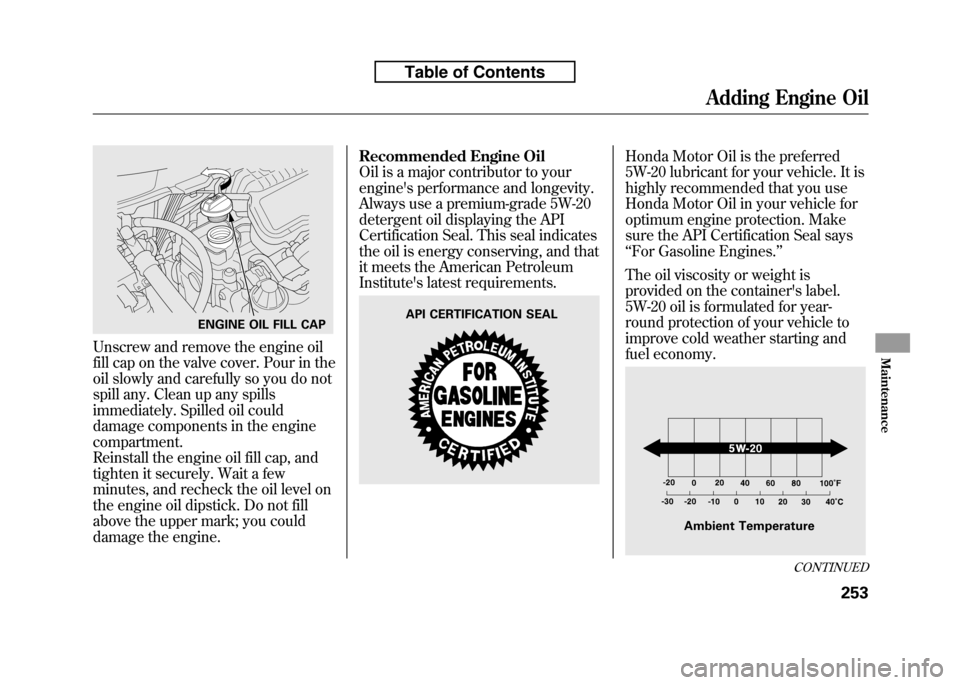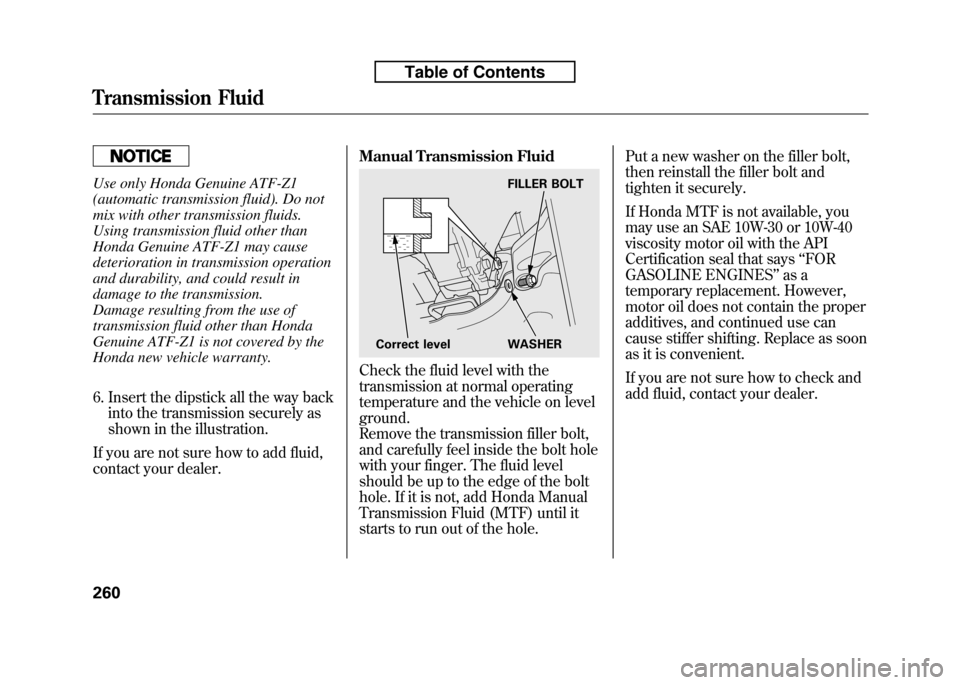2010 HONDA FIT oil viscosity
[x] Cancel search: oil viscosityPage 7 of 351

Meters, Gauges............................ 68
Methanol in Gasoline .................198
Mirrors, Adjusting ......................101
Modifications ............................. 207
Modifying Your Vehicle .............207
N
Neutral Gear Position .................221
New Vehicle Break-in .................198
Normal Shift Speeds ..................218
NOTICE, Explanation of ................i
Numbers, Identification .............316
O
Octane Requirement, Gasoline ................................. 198
Odometer ..................................... 70
Odometer, Trip ............................ 69
Oil Change, How to ......................254
Change, When to ....................245
Checking Engine ....................201
Life, Engine ............................. 245Pressure Indicator
.............60, 303
Selecting Proper Viscosity
Chart ................................... 253
Onboard Refueling Vapor Recovery ................................ 326
ON (Ignition Key Position) ..........80
Outside Mirrors .........................101
Overheating, Engine ..................301
Owner's Maintenance Checks ....250
Oxygenated Fuels ......................198
P
Paddle Shifters ........................... 224
Panel Brightness Control .............76
Park Gear Position .....................220
Parking ...................................... 229
Parking Brake ............................ 102
Parking Brake and Brake System
Indicator ........................... 60, 305
Parking Lights ............................. 74
Parking Over Things that Burn ................................ 229, 328
Passenger Airbag Off Indicator ....31
PGM-FI System .......................... 327Playing a Disc
.....................122, 149
Playing an iPod
®.................. 129, 170
Playing a PC card .......................158
Playing a USB Flash Memory Device ............................. 136, 177
Playing the AM/FM Radio .........143
Playing the FM/AM Radio .........115
Pollen Filter ............................... 268
Power Door Locks .......................81
Power Socket Location ...............106
Power Windows .........................100
Pregnancy, Using Seat Belts ........16
Preparing to Drive ......................215
Proper Seat Belt Usage ................14
Protecting Adults and Teens ........11
Additional Safety Precautions ...17
Advice for Pregnant Women ....16
Protecting Children ......................34
General Guidelines ..................34
Protecting Infants .....................39
Protecting Larger Children ......49
Protecting Small Children ........40
Using Child Seats with
Tethers ................................. 47
Using LATCH .......................... 43
CONTINUED
Index
VII
INDEX
Page 11 of 351

Used Oil, How to Dispose of......255
V
Vehicle Capacity Load ................209
Vehicle Dimensions ...................318
Vehicle Identification Number ...316
Vehicle Stability Assist (VSA
®),
aka Electronic Stability
Control (ESC), System
VSA OFF Indicator ..................233
Vehicle Stability Assist (VSA) System ................................ 233
VSA OFF Indicator ...................67
VSA OFF Switch .....................234
VSA System Indicator ..............67
Vehicle Storage .......................... 281
Ventilation .................................. 112
VIN ............................................ 316
Viscosity, Oil .............................. 253
W
WARNING, Explanation of ...........iii
Warning Labels, Location of .........54Warranty Coverages (U.S.
only) ....................................... 333
Washer, Windshield Checking the Fluid Level ........258
Fluid Level Indicator (Canada only) ..................................... 65
Operation ................................. 73
Wheels Adjusting the Steering ..............77
Alignment and Balance ...........276
Compact Spare ........................284
Wrench, Nut ........................... 285
Windows Auto Reverse ........................... 101
Operating the Power ...............100
Rear, Defogger ......................... 76
Windshield Cleaning ................................... 73
Defroster ................................. 113
Washers ............................ 73, 258
Wipers, Windshield
Changing Blades .....................269
Operation ................................. 73
Rear Windshield Wiper and Washer ................................. 73
Worn Tires ................................. 275Wrecker, Emergency Towing
....311
Index
XI
INDEX
Page 219 of 351

Fuel Economy Factors
The following factors can lower your
vehicle's fuel economy:● Aggressive driving (hard
acceleration and braking)
● Excessive idling, accelerating and
braking in stop-and-go traffic
● Cold engine operation (engines
are more efficient when warmedup)
● Driving with a heavy load or the air
conditioner running
● Improperly inflated tires Improving Fuel Economy
Vehicle Maintenance
A properly maintained vehicle
maximizes fuel economy. Poor
maintenance can significantly reduce
fuel economy. Always maintain your
vehicle according to the maintenance
messages displayed on the
information display (see
Owner's
Maintenance Checks on page 250).
For example:
● Use the recommended viscosity
motor oil, displaying the API
Certification Seal (see page253).
● Maintain proper tire inflation -
An under-inflated tire increases‘‘ rolling resistance, ’’which reduces
fuel economy.
● Avoid carrying excess weight in
your vehicle -It puts a heavier
load on the engine, increasing fuel consumption. ●
Keep your vehicle clean -In
particular, a build-up of snow or
mud on your vehicle's underside
adds weight and rolling resistance.
Frequent cleaning helps your fueleconomy.
Drive Efficiently● Drive moderately -Rapid
acceleration, abrupt cornering, and
hard braking increase fuelconsumption.
● Observe the speed limit -
Aerodynamic drag has a big effect
on fuel mileage at speeds above 45
mph (75 km/h). Reduce your
speed and you reduce the drag.
Trailers, car top carriers, roof
racks and bike racks are also big
contributors to increased drag.
● Always drive in the highest gearpossible -If your vehicle has a
manual transmission, you can
boost your fuel economy by up
shifting as early as possible.
Fuel Economy
204
Table of Contents
Page 268 of 351

Unscrew and remove the engine oil
fill cap on the valve cover. Pour in the
oil slowly and carefully so you do not
spill any. Clean up any spills
immediately. Spilled oil could
damage components in the enginecompartment.
Reinstall the engine oil fill cap, and
tighten it securely. Wait a few
minutes, and recheck the oil level on
the engine oil dipstick. Do not fill
above the upper mark; you could
damage the engine.Recommended Engine Oil
Oil is a major contributor to your
engine's performance and longevity.
Always use a premium-grade 5W-20
detergent oil displaying the API
Certification Seal. This seal indicates
the oil is energy conserving, and that
it meets the American Petroleum
Institute's latest requirements.
Honda Motor Oil is the preferred
5W-20 lubricant for your vehicle. It is
highly recommended that you use
Honda Motor Oil in your vehicle for
optimum engine protection. Make
sure the API Certification Seal says‘‘
For Gasoline Engines. ’’
The oil viscosity or weight is
provided on the container's label.
5W-20 oil is formulated for year-
round protection of your vehicle to
improve cold weather starting and
fuel economy.
ENGINE OIL FILL CAPAPI CERTIFICATION SEAL
Ambient Temperature
CONTINUED
Adding Engine Oil
253
Maintenance
Table of Contents
Page 275 of 351

Use only Honda Genuine ATF-Z1
(automatic transmission fluid). Do not
mix with other transmission fluids.
Using transmission fluid other than
Honda Genuine ATF-Z1 may cause
deterioration in transmission operation
and durability, and could result in
damage to the transmission.
Damage resulting from the use of
transmission fluid other than Honda
Genuine ATF-Z1 is not covered by the
Honda new vehicle warranty.
6. Insert the dipstick all the way backinto the transmission securely as
shown in the illustration.
If you are not sure how to add fluid,
contact your dealer. Manual Transmission Fluid
Check the fluid level with the
transmission at normal operating
temperature and the vehicle on levelground.
Remove the transmission filler bolt,
and carefully feel inside the bolt hole
with your finger. The fluid level
should be up to the edge of the bolt
hole. If it is not, add Honda Manual
Transmission Fluid (MTF) until it
starts to run out of the hole.Put a new washer on the filler bolt,
then reinstall the filler bolt and
tighten it securely.
If Honda MTF is not available, you
may use an SAE 10W-30 or 10W-40
viscosity motor oil with the API
Certification seal that says
‘‘FOR
GASOLINE ENGINES ’’as a
temporary replacement. However,
motor oil does not contain the proper
additives, and continued use can
cause stiffer shifting. Replace as soon
as it is convenient.
If you are not sure how to check and
add fluid, contact your dealer.
FILLER BOLT
Correct level WASHER
Transmission Fluid
260
Table of Contents